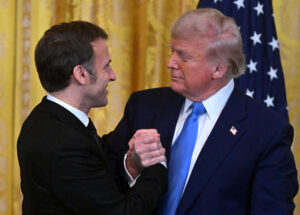Brussels – Yesterday’s rebound of European and Asian stock markets already seems to be fading after Beijing’s decision to impose 84 percent counter-tariffs on US products heavily hurt Wall Street.
This morning (April 11), the dollar continued its free fall against major currencies, settling at 2024 lows. The White House decisions on tariffs and uncertainty about economic growth trends are weighing on the US currency. The euro thus rose to 1.1282 on the greenback, up 0.8 percent and moving to the highest level since early 2022, after also touching 1.1376 overnight. Also strengthening on the dollar were the pound at 1.3015, up 0.3 percent, and the Swiss franc at 1.2202, up 0.6 percent to all-time highs. Among stock indexes, the Dow lost 2.5 percent, the Nasdaq Composite 4 percent, and the S&P 500 3.4 percent. The slump fueled investor distrust, leading former US Treasury Secretary Janet Yellen to call the tariffs imposed by President Donald Trump “The worst self-inflicted wound I have ever seen imposed by an administration on a well-functioning economy.”
In Europe, the situation is getting complicated. After a remarkable Thursday, with the announcement of a 90-day tariff suspension, volatility is running high in the Stock Exchanges of the old continent. Optimism waned, and stock exchanges slowed from the start of the session, with Milan (-1.5 percent) turning lower. Uncertainty over US trade policy and global recession fears are in the spotlight. The Stoxx 600 index gained 0.5 percent. Paris was up (+1.1 percent), Madrid (+0.8 percent), Frankfurt (+0.6 percent), and London (+0.5 percent). Gains are driven by utilities (+1.1 percent), with gas prices rising 1.1 percent to 33.70 euros per megawatt-hour. Also doing well are pharmaceuticals (+0.9 percent) and technology stocks (+0.8 percent). Luxury stocks also rose after Prada purchased Versace (+2.3 percent). Banks recovered (+0.8 percent) after negative performances in previous sessions. Energy is down (-0.9 percent), with oil prices on the rise.

In Milan, Stellantis (-4.2 percent) slipped after announcing lower estimates. UniCredit and Amplifon (-2 percent) and Monte dei Pachi (-1.8 percent) were also lower. The BTp-Bund spread rises to 127 points, with the yield on the Italian 10-year at 3.87 percent. This morning, French President Emmanuel Macron said the suspension of US tariffs should not be underestimated, calling it a “fragile pause.” “Fragile because the 25 percent tariffs on steel, aluminum, and automobiles and the 10 percent tariffs on all products are still active. We are talking about 90 days of uncertainty for all companies.”
Asian stocks closed the session mixed, weighed down by investor sentiment as they look at possible impacts on economic growth trends, with speculation of a recession becoming more concrete. Tokyo ended down 2.96 percent. On the foreign exchange front, the devaluation of the dollar against the yen, just below 144, and against the euro at 162.20, continues to affect the sustainability of made-in-Japan exports. China’s financial stock markets closed the session in positive territory, recovering from initial losses triggered by Wall Street’s renewed slump on fears of the harsh China-U.S. trade clash and recession risks. The Shanghai Composite Index rose 0.45 percent to 3,238.23 points, while the Shenzhen Composite Index advanced 0.72 percent to 1,881.78.
The market situation remains highly volatile, especially now that China has just announced raising its counter-tariffs from 84 percent to 125 percent, adding more fuel to the fire of the trade war between the two sides of the Pacific.
English version by the Translation Service of Withub

![La presidente della Commissione europea, Ursula von der Leyen, alla conferenza annuale degli ambasciatori [Bruxelles, 4 febbraio 2025]](https://www.eunews.it/wp-content/uploads/2025/02/vdl-ambasciatori-350x250.png)




